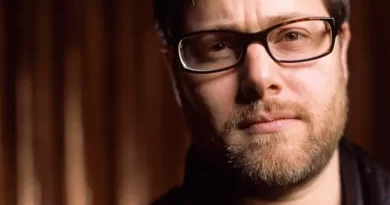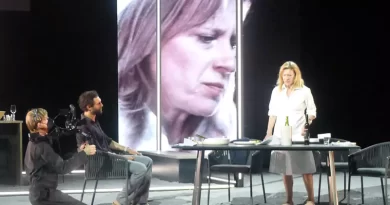Frank Hoffmann, Artistic Director of the Théâtre National du Luxembourg (TNL), interviewed by Dana Rufolo
EUROPEAN DIRECTORS SERIES OF INTERVIEWS
Interview conducted on 31 January, 2024.

Photo credit: Axel Hörhager.
Frank Hoffmann is the founding artistic director of the Théâtre National du Luxembourg, one of the six theatres in the capital city. According to its mandate, the TNL is devoted to the production of works of literature, including dramas written by Luxembourgish authors, in the official languages of Luxembourg: French, German and Luxembourgish. Due to the presence of nearly 50% foreigners whose most common second language is English and to a significant Portuguese population living in Luxembourg, the TNL also regularly produces plays in English and has begun to occasionally produce dramas in Portuguese as well.
The TNL is the only theatre in the county of Luxembourg to have joined the Union of European Theatres. It did this in 2013, thereby increasing its visibility and internationalism (see previous interview with Gabor Tompa.)
In this interview, I have asked Frank Hoffmann to formulate his aesthetic concepts as a director and to evaluate the role of his theatre in sustaining the classics and encouraging budding talent.
(DR)
DR: There are several good theatre directors in Luxembourg, but you stand out, Frank Hoffmann, as perhaps the most internationally inclusive of them all, due to your academic background. You attended the University of Heidelberg and started a theatre company there and then worked as a director around Germany and eventually returned to Luxembourg to found the Théâtre National du Luxembourg. Can you tell me, what drew you to theatre? What was the initial impetus?
FH: My father was a member of the programming directorate of the Théâtre Municipal – now called the Grand Théâtre – and he frequently took me with him to see shows. My mother (who was from a family of farmers) and I regularly attended an amateur theatrical event – a comedy – in her village that took place a couple of days before Christmas with the actors being the farmers and village folk. For me, it was the most important day of the year. Later on, I took diction and dramatic art lessons with the Luxembourger Tun Deutsch, an actor and leading theatrical innovator in Luxembourg in the middle of the last century. At Heidelberg, where I focused on literature and philosophy and eventually got my doctorate, I joined a very fine university theatre group in the French language and acted in plays by Jean Giraudoux and Georges Feydeau. Then I founded my own troupe; using a play on words; I called it Klammerspiele [small theatres in Germany are often called Kammerspiele, for instance the Münchner Kammerspiele in Munich] and then a second troupe in the Romance Languages department of the university of Heidelberg that still exists today as the Theater im Romanischen Keller.
After Heidelberg, I returned to Luxembourg for around two years. Among other productions, I staged Friedrich von Schiller’s drama Demetrius which was unfinished at the time of his death; I and my team wrote the ending we imagined Schiller intended. This got attention, and I was able to work as a director outside the country for several years, returning only to found the Théâtre National du Luxembourg in 1995.
DR: Yes, that was an amazing feat. A theatre located in a former factory producing metal objects – and just two kilometres from the centre of the city. What’s the story behind the creation of the Théâtre National du Luxembourg?
FH: In 1995, Luxembourg was the European Capital of Culture, and at that time I approached the Minister of Culture, Mrs. Erna Hennicot, and asked why there wasn’t a national theatre. She agreed it was a lacunae and asked me to come in with my team (myself, a set designer, a dramaturge, and an administrator) and see what they could come up with.
Initially, we produced our plays in other theatres in the city of Luxembourg or Esch, but then in 2001 the state purchased this former foundry and transformed it into a theatre, with a few remaining parts of the foundry in evidence. It officially opened January 2005 with Hamlet, and the actor Thierry van Werveke who played Hamlet warmed his fingers in the first act over the original cheminée or hearth of the foundry which has been integrated into the theatre’s structure.

Separate rehearsal building.
Photo credit: Axel Hörhager.
DR: What is your aesthetic view of theatre, as a director?
FH: Theatre has to tell a story. Always. Even today. Sure, theatre is performance, acts, costume, but what really captivates audiences is the story.
Additionally, for me as a director I pay great attention to the organization of the stage space.
DR: In your recent production of “Die Möwe” (“The Seagull” by Anton Chekhov, which played at the Theater Trier, across the border in Germany), I noted that the long, white, rectangular set on stage was not distinctly Russian in any way.
FH: Exactly. It could have been in Paris, London or Berlin. An enormous empty space. That’s because my scene designer is [internationally acclaimed artist] Ben Willikens. His paintings characteristically feature empty space. I know exactly what his setting will be: a great (white) empty space where the actor or actress is solitary and small. I’ve worked together with him for years; our first production together was Marat/Sade back in 1990.
DR: And other aspects of your personal directorial aesthetics?
FH: Let’s take The Seagull as an example again. I ensured that the actors were all at a similar level of competence in the production. I do not like the star system, with one or two actors who dominate. I consider the actors a group and ensure that even actors playing minor roles are valorised.
And furthermore, the play has to correspond to the reality of our times, even a play by Shakespeare or Molière. I couldn’t do a play by a Russian author, The Seagull in early 2024 for instance, without putting in some reference to the war in Ukraine. That’s why the last words spoken in my production are, “The war has begun”.
DR: And how about the lazzi that were inserted into “The Seagull”? I saw a lot of absurdist elements in your “The Seagull”. For instance, the lovemaking between Polina and the doctor. She aggresses him, she plays the seduction “over the top.” It becomes funny, even.
FH: I never direct a play without making sure there are comic moments or humorous scenes in it. I’m convinced that humour doesn’t in any way distract from the tragic. On the contrary, the contrast makes the tragic elements more noticeable. Even the great tragedies have their moments of comedy, and I draw out these moments. The question of humour is extremely important to me. Humour is essential in the theatre.
Returning to how you directed “The Seagull”, after the visit from Nina towards the end of the play, Konstantin totally dissolves. You have instructed the actor to move in a spasmodic and jerky way, as if he were a marionette. It is as if he doesn’t know how to control his body once he has lost control of his emotions.
FH: Yes, Konstantin has had a certain measure of literary success, but his mother hasn’t recognized this. She says, “I’ve never read anything he wrote.” It is her approval that he seeks. Yes, Konstantin can’t even walk in a straight line any more. But you might recall that he lights a cigarette lighter with the possible consequence of burning down the entire house when he commits suicide. When my actor Marvin Groh asked why Konstantin does this, I told him it is because he realizes that if society is going to change in a more humanist direction, it isn’t an individual act of protest that will change society but a collective action.
There are elements of absurdity but also of surrealism in The Seagull; I introduce these elements almost as my signature you could call it, having been raised on Beckett, Ionesco and above all Kafka. But I never introduce these elements immediately. I bring my audience along to the point where they accept these intrusions into the reality of the play itself. I always begin a play in the most basic and straightforward fashion possible.
DR: Your theatre, the TNL, is famous for its multilingualism. Not only plays in Luxembourgish, German and French but also in English and Portuguese. Recently, you gave an extraordinary production – “Dekalog der Angst” (“Decalogue of Anxiety”) based on texts from Plato, Sophocles, Calderón, Dostoevsky, Chekhov, T.S. Eliot, Heiner Müller and Marina Tsvetaeva, featuring eight languages including Bulgarian, Greek, Russian, French and German. There were two Bulgarian directors and it played in Sofia, Bulgaria and Porto, Portugal. But it premiered here, in Luxembourg on 24 January, 2023.
FH: Being capable of handling multiple languages is a huge advantage, but also it is a challenge. I’m envious of the German or French directors who need to work in only one language. Here, I am increasingly asked to do shows in English, Portuguese [14% of the population in Luxembourg is Portuguese] now even Italian and Spanish. It is really difficult. We know that when a show is in Portuguese, we won’t have anywhere near a full house. The Portuguese living here haven’t developed a theatre-going habit. Sometimes it works well, sometimes not at all.
It was very difficult to bring in the public to Decalogue of Anxiety. Even though the entire play was surtitled in English, only at the finale did we have anywhere near a full house.
DR: How about your “Café Terminus”, an early 2024 production? That was in the Luxembourgish language exclusively.
FH: Despite the fact that I am known in Luxembourg as a director of the Avant Garde, I really like Popular Theatre and a highly successful very recent drama I wrote, Café Terminus, definitely Popular Theatre, is an adaptation of Eugene O’Neill’s The Iceman Cometh. Perhaps I should say I let myself be inspired by The Iceman Cometh, because I completely rewrote it. By the way, I saw a four-hour-long production in Heidelberg decades ago. I kept O’Neill’s structure, with Hickman coming from the exterior, only I call him by his first name Theo, but I made it into a very Luxembourgish play. The characters were all recognizable well-known local personages, which provides an enormous amount of humour. That played to a full house every night.
DR: Do you see yourself as a European director?
FH: I am in the European theatre scene but also marginal. I’m not part of the European theatre crowd, because when I leave work, I go back into my private life and don’t necessarily associate with other persons of the theatre.
This interview has been translated from the French.









